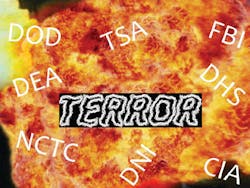Gauging Our Nation's Defenses
Last month we observed the tenth anniversary of the horrific events that occurred on Sept 11, 2001. That day was a wakeup call for the U.S. Heretofore we assumed no country had the temerity to attack us on our own soil. We were wrong . . . very wrong. The enemy took out 3,000 innocent civilians in the blink of an eye with a well-coordinated three pronged attack. We vowed something like that would never occur again, and set about strengthening our law enforcement assets to ensure we were better prepared. How have we done? Have we made our nation a hard target, or just paid lip service to recommendations from experts in the field?
Let’s look at the FBI. According to its own website, www.fbi.gov, the Bureau claims to have made 249 arrests over the past ten years in the area of counterintelligence, 46 of those related to spying. The FBI is the lead agency in that area, domestically, while the CIA has international responsibility. After 9/11 the wall that existed between the FBI and CIA was noted to be a key factor in the lack of shared information that could have alerted us to an attack. To some extent that wall has become more porous, yet there is still a parochial mindset on behalf of both agencies.
In the area of counterterrorism, the number of Joint Terrorist Task Forces (JTTF) stands at 104, up from 35 in 2001. The JTTFs include 41 member agencies and nearly 4,500 personnel. Newly created FBI “Fly Teams,” respond to incidents and threats around the world, most recently in Saudi Arabia, Indonesia, Pakistan, England and Spain. The Bureau has teams of agents in Afghanistan and Iraq, as well as 60 legats in offices world-wide.
In Northern Virginia, a central repository for intelligence has been created. The National Counter Terrorism Center (NCTC) collects and analyzes intel from the FBI, CIA, Capitol Police, DOD and Homeland Security. NCTC serves as a knowledge bank, sharing information on known and suspected terrorists and international terror groups.
In an effort to bolster our defenses, the 9/11 Commission was created in 2002, and then disbanded after making its recommendations in 2004. Last month, a member of that group, Lee Hamilton, remarked on the Commission’s recommendations ten years later. Hamilton advised the U.S. remains vulnerable to cyber-attacks on utilities, banks and other civilian institutions, as well as physical attacks from lone-wolf and home grown radicals.
Additionally, former U.S. Representative Tim Roemer recommended intelligence agencies have oversight by one or two congressional committees. That apparently went in one ear and out the other. We now have at least 108 Congressional committees and subcommittees overseeing our intelligence agencies. This kind of bureaucracy negates the ability to allow for secrecy and for quick decision making.
Among the recommendations made by the 9/11 Commission was to institute an Entry/Exit system that would track visitors to our country. By using a biometric technological entry-and-exit system, authorities could easily determine those who have overstayed their welcome. The country does have an entry system that cross-references fingerprints and other data against terrorist databases, but lacks any system that checks people when they exit the country.
Another recommendation of the Commission was the establishment of a Director of National Intelligence. That has come to fruition but is problematic in that the office oversees 17 spy agencies. That many agencies means inherent turf battles and budget problems, particularly when the budget is controlled by Congress. In addition, the office has seen four different Directors in the last six years. Translation: a problem exists within the structure that’s only apparent once a new leader is allowed to view the inner-workings.
There is still a huge stumbling block when it comes to first responders being able to communicate with each other. This inability of police, fire-fighters and paramedics to talk to each other was a huge impediment to assessing the scope of the attack and rendering assistance to those who needed it. The 9/11 Commission recommended part of the radio spectrum be dedicated for public safety purposes. According to the National Security Preparedness Group (NSPG), “To date, this recommendation continues to languish. Despite the lives at stake, the recommendation to improve radio interoperability for first responders has stalled because of a political fight over whether to allocate 10 MHz of radio spectrum—the D-block—directly to public safety for a nationwide network, or auction it off to a commercial wireless bidder who would then be required to provide priority access on its network dedicated to public safety during emergencies.” Bottom line: emergency personnel are still unable to talk to each other in catastrophic situations.
The TSA was established to ensure the safety of all airline passengers. Screening at airports has been less than adequate, with most tests involving firearms and explosive materials undetected. Ineffective scanners, and intrusive pat downs on babies and disabled individuals, have riled and frustrated the flying public to the extent that many citizens have no confidence in TSA whatsoever. According to the NSPG, “Unfortunately, explosives detection technology lacks reliability and lags in its capability to automatically identify concealed weapons and explosives. The next generation of whole-body-scanning-machines is also not effective at detecting explosives hidden within the body and raise privacy and health concerns that DHS has not fully addressed.”
So, are we better off than we were ten years ago? In my view we have made improvements, yet we are still much too vulnerable. I see two chronic problems. First, too many agencies doing the same thing, and, second, too many bureaucrats in charge of people doing police work. When Congress oversees any agency and controls its people and budgets, there will rarely be progress on any front. Add to the mix the political correctness that characterizes Congress and all of its cronies and sycophants and you’ve got a recipe for disaster.
The good news: most cops will still get the job done despite the interference of bosses and overseers who haven’t a clue. That’s what keeps us safe and will continue to be our ace in the hole.
Stay safe, Brothers and Sisters!
Web Links:
- LivSafe--Stay Aware, Stay Safe!
- Chicago Warriors Midnight Battles in the Windy City by John Wills
- Gripped By Fear by John Wills
About The Author:
John M. Wills spent 33 years in law enforcement as a Chicago Police Officer and FBI Special Agent (Ret). He is a Freelance Writer and Speaker whose third book, TARGETED, is now available online at Amazon and Barnes & Noble. Contact John through his website: www.johnmwills.com.

John Wills
John M. Wills is a former Chicago police officer and retired FBI agent. He is a freelance writer and award-winning author in a variety of genres, including novels, short stories and poetry. John also writes book reviews for the New York Journal of Books, and is a member of the National Book Critics Circle. His new book, The Year Without Christmas, is available now. Visit John at: www.johnmwills.com.



